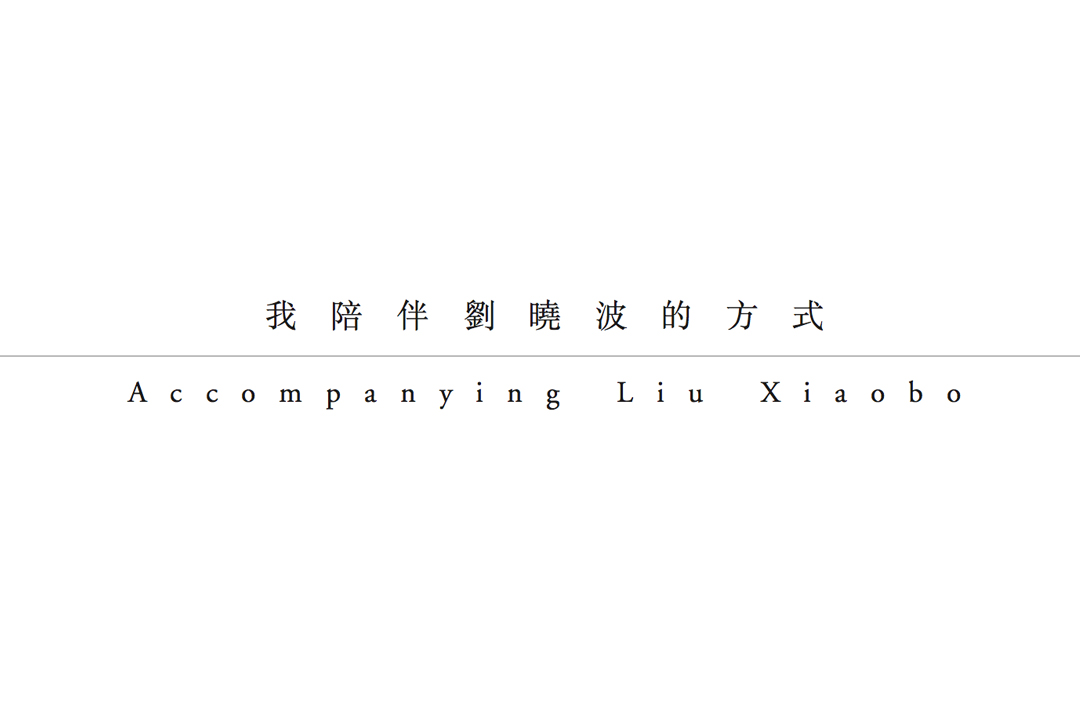
Liu Xiaobo's Preface
July 5, 2017
My praise could be a poison impossible to forgive:
Dim desk lamp...the first desktop computer you gave me, possibly a Pentium 586.
That room, so plain and cramped, and yet we always let love’s gaze crowd tightly in.
You must have seen that savage short poem of mine about the little shrimp (my wife)—she dove into the congee for me. It took 360 seconds to write that most earth-shattering, praiseworthy poem.
Dim desk lamp...plain and cramped room...already peeling tea table...and the savage imperative of the little shrimp—a melding like the stunned first contact of rock and star, merging as seamless as heavenly clothes.
From this point on, praise became the karma of my life, or the hibernating instinct of a polar bear enjoying the boundless white snows.
Caught in “One Bird and Another Bird”...seized by its beauty...alive within me to the end—the little shrimp’s poem forged from the combination of ice and darkness, like the black-and-white poetry she captures in her photographs. With a senseless, crazed tranquility in the face of suffering, the bitter little dolls rise out of a bared heart...and dispel a curtain of smoke.... Maybe the wooden figures draped with black armbands are the women who witnessed Christ’s resurrection, or the witches of Macbeth. No, no, it’s not that... it’s the lonely wilderness, utterly unique and unmatched, of the little shrimp being written...it’s the white lily swallowed by the sandstorm on the ash-dark horizon—an offering to the departed spirits.
From the very start, each painting the little shrimp completed became a part of the never-to-be-completed cycle of fate’s sorrow. To this day, my biggest regret is not being able to arrange her first exhibition, “Poems, Paintings, Photographs: Black-and-White Intertwined”—the little shrimp’s three arts united as one.
Ice akin to love’s ferocity, darkness akin to love’s remoteness...maybe my cheap and vulgar praise can only face these blasphemous poems, paintings, images...and ask G. for forgiveness.
G., how many days delay before I had the strength to finish your assignment.
translated by Jeffrey Yang




Initium’s Interview of Liu Xia’s Friend G.
I didn’t believe it when I heard that Xiaobo was gravely ill. I told H that I insisted on hearing his voice.
I trusted H. I knew that he would understand that I raised this request stubbornly after I considered all the possible consequences. I also understood that during the past twenty years H had always stood up for what he thought was worthwhile and otherwise he would refrain himself. I let him decide.
On June 27, I received a voice message from Xiaobo. “G., we haven’t seen each other for such a long time. Don’t worry about me. I’m as tough as a nail. We’ve been through so much, this is nothing. I’ll be fine for sure, so don’t worry, I’ll hang on ... for Liu Xia. ...”
His message began in the same teasing tone he had always used with me whenever we used to hang out together. But then he suddenly choked up when he mentioned Liu Xia’s name. He stopped and didn’t go on.
Later, I received two texts, one includes: “The times Xiaobo misses the most are when you and Liu Xia were buzzed while he played bartender—popping corks, pouring drinks, waiting on you two hand and foot. When can we have those times back again? [Raised fist + crying emojis].”
I realized then that his final days were fast approaching.

I work as an editor. Several years ago I helped to compile a collection of Liu Xia’s photographs. We wanted to publish a beautiful book that conveyed the power and depth of her art. We invited Professor Perry Link to write a long introduction, everyone who read it couldn’t bear to put it down. Unfortunately, some unforeseen obstacles stopped us from publishing it at that time. Later, when the idea for the project was revived, we thought it would be better to wait until Xiaobo was released. We figured it would only be delayed by a few more years. We wanted to make sure we wouldn’t “sideline” this “wife-worshipper” [Xiaobo]. Among Liu Xia’s women friends, Xiaobo was known as an unmitigated “fool of a Romeo.” He lived by that reworked Chinese proverb: “No one writes better than my wife, and no one’s wife is better than mine.”
In my naiveté, it never occurred to me the day we were waiting for would never come.
When I heard Xiaobo’s voice, I realized that anything was possible.
I pulled out all the files of Liu Xia’s photo collection, selected 12 images from the galleys and sent to Xiaobo. I wanted him to see her author’s words, her portrait photo, and especially the title of the book: “Accompanying Liu Xiaobo.”
Liu Xia had come up with the title on her own. She had just blurted it out over the phone when I asked her for a title. That the title came to her so easily made sense—she had become interested in photography when Xiaobo was imprisoned (i.e., in a forced-labor camp) for the second time. At the time, the most pressing question for her and for all friends around was: What would she do everyday during this difficult period? Her brother Liu Hui, the one who had always been there for her, bought her a Leica camera. Crazy expensive. He bought it anyway. That’s how Liu Xia began taking photos. At first, even though she couldn’t even focus properly, her images struck a deep chord. She wrote a poem for her brother’s 44th birthday with the line: “It’s tough to be my brother, isn’t it?” When I read this, I tore it up...
In the pre-dawn hours of July 2, I asked Xiaobo to write something for me. I had been looking at Liu Xia’s photos over and over again that night, talking with a designer about how to resume the book project. Then straight away I gave Xiaobo an “assignment,” telling him to write about Liu Xia’s photographs, paintings, and poetry.
On July 3, I called again to request his assignment. The answer I received read: “Making time to do your assignment.”
Every so often I would send some new tidbits to move the assignment along. I knew H would understand.
Among eight of Liu Xia’s photographs I sent, Xiaobo had definitely already seen seven of them, having looked at them again and again over a long period of time. But one of them he might not have seen before—Liu Xia had taken it after his last arrest. She had fashioned a set of figures out of aluminum foil. A tempestuous still life. A tempest as heavy and yet as at peace as a fossil.
From the news, it appeared that Xiaobo’s cancer was rapidly spreading.
I thought of a way to lessen the burden on him. I suggested that he dictate the piece to me.
An answer came: “Our Lord and Master said his voice is too weak. He will work his way through the assignment by writing.”
Nothing came. I wrote again: “Just jot down a few phrases of whatever comes to you. I’ll put it together for you.”
Another answer came: “It’s hard for him to talk now. Dry mouth, metallic taste [crying emoji].”
I replied again: “Write whatever, just one or two lines [crying emoji].”
The answer came: “He’s written quite a chunk, still planning to write more.”
I replied again: “ Marvelous! Go on [crying emoji].”
…..
On July 9, I received a set of photos, a line drawing, and three pages of a handwritten manuscript. The manuscript ends with: “G., how many days delay before I had the strength to finish your assignment.” It was dated July 5.

During Xiaobo’s final days, I did not withhold my praise for him. Back when we used to hang out together, I would spend all my time joking with him. But not this time. I told him, with great seriousness, that his greatest achievement had not been in fighting dictatorship, but in fighting patriarchy. Dictatorship had continued for mere centuries, whereas we had endured patriarchy for millennia. Only a handful of great men understand the deep connection between the two, and even fewer attempt to tackle it. I told him to think, one by one, about each of the important men in the Chinese history—he alone had transcended patriarchy and had become a towering feminist.
I was told that Xiaobo became “shy” when he heard what I said about him.
During this period, my voice and text messages were all sent via WeChat, mainly to H and Xiaobo. There were no secret channels or mysterious middlemen. Not caring whether we were being watched, we did not try to hide anything. We spoke freely, basking in the enjoyment of the final days of our friendship.
Weeks earlier, we chatted like:
“How is he? Still garrulous?”
“He’s conscious, acts like a spoiled boy”
“Do three of you believe there will be a miracle?”
“Yes, we do.”
Weeks ago, Xiaobo still has the strength to miss my son:
“That year your lovely son played with Xiaobo at his home; now, even if he wanted to, he wouldn’t have the strength to lift him.” (Before going to summer camp, my son had kept asking, “Is Uncle Xiaobo getting better now?”)
I rarely sent anything to Liu Xia. Liu Xia never wrote back, and I never waited for her response. I simply told her: “Xia, it’s good to stand tall like a tree. But you’ve taken on too much already. You’ve earned the right—while your fool is still with you, stretch out a bit, let down your hair, and be his pearl and his queen. Help him be as wife-crazy as he wants to be. That’s really so much greater than being a freedom fighter.”
“A tree” is a metaphor in one of Liu Xia’s poems:
Why drawing a tree?
She likes to keep standing
A tree must feel weary to keep standing throughout her life
Even though, she must
At the time, Liu Xia remained silent, just like a tree.
I went with X., another of Liu Xia’s woman friends, to our favorite boutique and we asked L., one of the best designers in Beijing, to make a long, black, gauze dress, as elegant and gorgeous as possible. As soon as the rush job was finished, we sent the dress to R., another woman friend, hopefully to pass it on to Liu Xia. She is finicky about these things. She should at least have something decent to wear, when seeing him off.
After everything Xia and Xiaobo went through, I will never again dare to say that I have lost my faith in love.
translated by Louisa Chiang




並沒有興趣和意願要做一朵大愛包容純潔無瑕的黃蓮花。
@Zeno119 你可以有自己的观点,但是礼貌地表达自己的观点,这也是体现一个人是否具有良好素质。
轉噴樓上這種SB。
@Zeno119 满嘴喷粪
水準高得像波波😄
沒有在紀念劉先生的文章下進行歧視、謾罵、恐嚇言論的人,應該不會太低。
你水準多高?
@ZENO119 希望不要把自己降低到中國糞青五毛的水平。
劉曉波是個過去式,
與其花時間緬懷,
不如琢磨如何前行。
香港人得回過神:
你們要大愛開化包容北方部落的天真想法是會令你們的生活品質和自由都付出代價。
沒有槍或失去用武力來捍衛自己價值和生活方式的勇氣,
對著悍匪說再多都是廢話。
台灣之所以還堅挺,
對黃俄來說,
懼怕的根本不是什麼民主自由的憲政,
而是台灣人有槍。
可以開槍反擊就算贏不了都要把支那豬拉下來陪葬順便炸飛東南部發達地區。